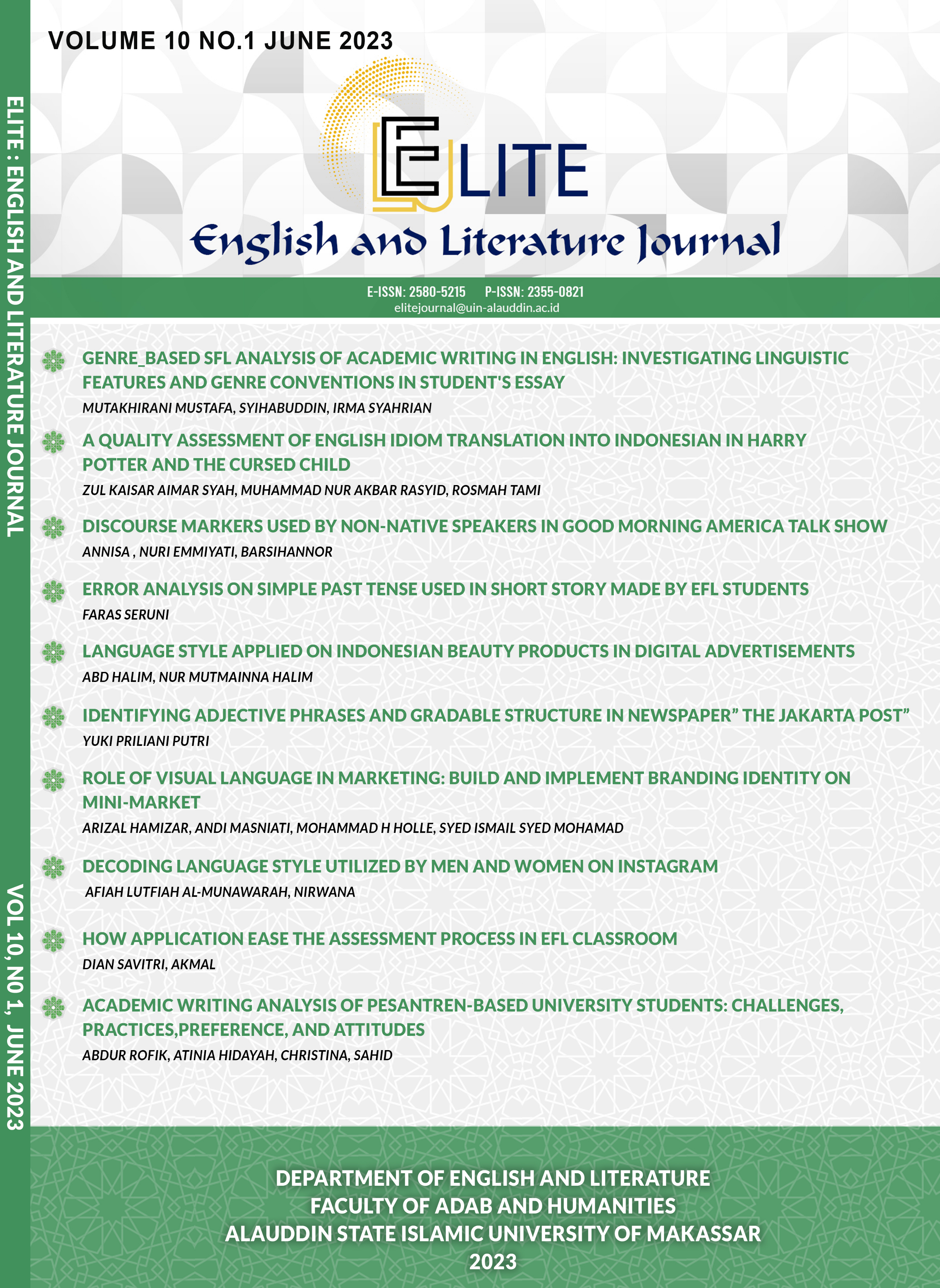How Application Ease The Assessment Process in EFL Classroom
Abstract
The learning process carried out in Indonesia is still dominated by large classes. It contains more than 20 students. This situation sometimes makes it difficult for teachers to conduct assessments because assessing and evaluating each student takes much time. Nowadays, the assessment process is quite diverse; teachers do not only do paper-based tests but can use application assistance. This study aims to see how well the Pintar Apps help teachers conduct student assessments. The method used in this study is qualitative, with instruments in the form of class observations and interviews. The subjects were 15 and 3 English teachers students of SMP Negeri 2 Tayu. The study results revealed that the application helps the student assessment process faster and more accurately. The teacher does not need to check the results of student answers one by one because the system automatically checks them. Pintar Apps as the student assessment application are beneficial for teachers in managing assessment activities in class. Furthermore, Pintar Apps even helps teachers administer the students who have used this application, and there is a list of them for all activities when using this application.
Downloads
References
Abduh, M.Y.M. (2021). Full-time Online Assessment during COVID -19 Lockdown: EFL Teachers’ Perceptions. Asian EFL Journal Research Articles, 28(1). https://www.asian-efl-journal.com/
Ahmadi, Dr. M. R. (2018). The Use of Technology in English Language Learning: A Literature Review. International Journal of Research in English Education, 3(2), 115–125. https://doi.org/10.29252/ijree.3.2.115
Amelia, R., Istianah, T.N. (2021). Teaching strategies: How do teachers in remote area survive during remote learning?. Journal of English Language Teaching, 10(2), 146-153. https://doi.org/10.15294/elt.v10i2.47856
Astuti, T., & Indriani, L. (2020). The EFL Students’ Perceptions in Using Google Classroom for English Learning During Pandemic. Jurnal Review Pendidikan Dan Pengajaran, 3(2). https://doi.org/10.31004/jrpp.v3i2.1333
Fitriyah, I., & Jannah, M. (2021). Online Assessment Effect in EFL Classroom: An Investigation on Students and Teachers’ Perceptions. IJELTAL (Indonesian Journal of English Language Teaching and Applied Linguistics), 5(2). https://doi.org/10.21093/ijeltal.v5i2.709
Fowler, J., & Şarapli, O. (2010). Classroom management: What ELT Students Expect. Procedia - Social and Behavioral Sciences, 3, 94–97. https://doi.org/10.1016/j.sbspro.2010.07.017
Hasan, H. (2015). Kendala yang Dihadapi Guru dalam Proses Belajar Mengajar Matematika di SD Negeri Gani Kabupaten Aceh Besar. Pendidikan Guru Sekolah Dasar (PGSD) JURNAL PESONA DASAR Universitas Syiah Kuala, 1(4), 40–51.
Hashim, H. (2018). Application of Technology in the Digital Era Education. International Journal of Research in Counseling and Education, 1(2). https://doi.org/10.24036/002za0002
Keristiana, T., Arbain, A., & Fitriana, R. (2019). Teachers’ Strategies in Managing a Large Class in Teaching English at SMP Negeri 01 Tanjung Selor. Borneo Educational Journal (Borju), 1(1). https://doi.org/10.24903/bej.v1i1.258
Muin, C.F. (2021). Students’ Perceptions on the Use of E-Portfolio for Learning Assessment: A Case Study. Al- Ishlah: Jurnal Pendidikan. 13(1), 497-503. DOI: 10.35445/alishlah.v13i1. 485
Permendikbud Tahun 2016 Nomor 022 Lampiran, Pub. L. No. 22, 1 (2016).
Pazilah, F. N. P., Hashim, H., & Yunus, M. Md. (2019). Using Technology in ESL Classroom: Highlights and Challenges. Creative Education, 10(12), 3205–3212. https://doi.org/10.4236/ce.2019.1012244
Purnomo, H., Mahpudin, Sunanto, L. (2020). Pengelolaan Kelas Belajar Di Era 4.0. Jurnal Elementaria Edukasia, 3(1), 112-119. http://dx.doi.org/10.31949/jee.v3i1
Rahim, Ahmad F.A. (2020). Guidelines for Online Assessment in Emergency Remote Teaching during the COVID-19 Pandemic. Education in Medical Journal, 12(2), 59–68. https://doi.org/10.21315/eimj2020.12.2.6
Rotas, E. E., Cahapay, M.B. (2020). Difficulties in Remote Learning: Voices of Philippine University Students in the Wake of COVID-19 Crisis. Asian Journal of Distance Education, 15(2). 147-158. http://www.asianjde.org
Savitri, D. (2021). Effectiveness of The Digital Platform on ELT in Remote Area. ASELS_2021. https://doi.org/10.51773/asels2021.v1i1.8
Shehu, H., Page, |, & Tafida, A. G. (2016). Creative Strategies for Effective English Language Teaching In Large Classes. Quest Journals Journal of Research in Humanities and Social Science, 4(3)
Shyamlee, S.D., Phil, M. (2012). Use of Technology in English Language Teaching and Learning: An Analysis. In International Conference on Language, Medias and Culture (Vol. 33, pp. 150-156). DOI : 10.36106/paripex
Tukan, F. M. E. (2020). Challenges and Strategies Using Application in Teaching Online Classroom During Pandemic Covid-19. Elite: English and Literature Journal, 2(2), 155-172. https://elitejournal.org/index.php/ELITE/article/view/43
Yaman, N., & Muhlis, M. (2020). Students’ Social Presence And Perceived Learning Toward Ccu Course In Online Classroom (An Evaluating of Learning Process during Pandemic Coronavirus). Elite: English and Literature Journal, 7(1), 61-73. https://doi.org/10.24252/elite.v7i1a6
Copyright (c) 2023 Dian Savitri, Akmal

This work is licensed under a Creative Commons Attribution-NonCommercial-ShareAlike 4.0 International License.
Once an article was published in the journal, the author(s) are:
granted to the journal right licensed under Creative Commons License Attribution that allows others to share the work with an acknowledgement of the work's authorship.
permitted to publish their work online in third parties as it can lead wider dissemination of the work.
continue to be the copyright owner and allow the journal to publish the article with the CC BY-NC-SA 4.0 license
receiving a DOI (Digital Object Identifier) of the work.


